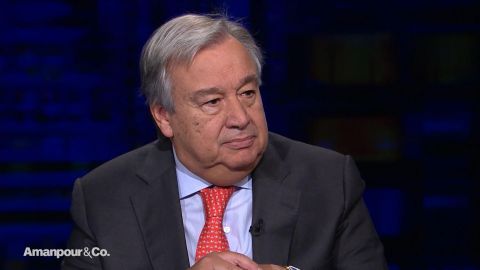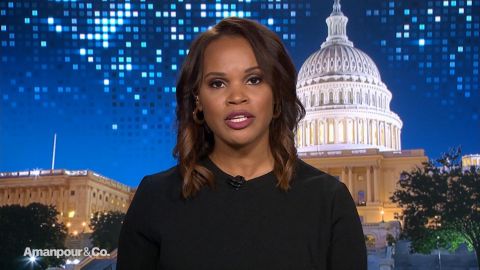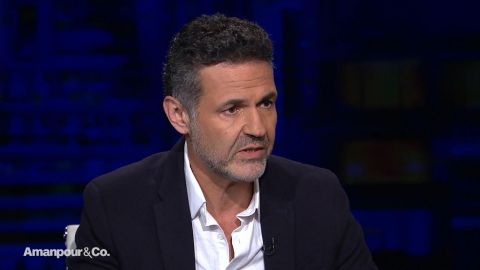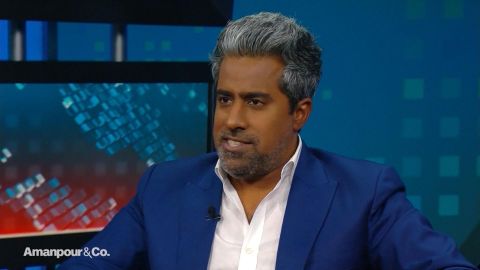Read Transcript EXPAND
HARI SREENIVASAN: Anand Giridharadas, thanks for joining us.
ANAND GIRIDHARADAS, AUTHOR, WINNERS TAKE ALL: Thank you for having me.
SREENIVASAN: Let’s first start with this thesis of yours, but let’s kind of explain it in something that happened recently. Jeff Bezos, the richest man in the world, I think he’s worth something around $162 billion depending on what the stock is doing today. He says he is going to focus his philanthropic efforts on two things, homelessness and dealing with low- income kids and education. He’s going to put $2 billion up there. What’s not to like?
GIRIDHARADAS: Jeff Bezos is joining the ranks of very widespread tendency in our time which is the winners of our age giving. One hundred and eighty-four people have signed the giving pledge to give a majority of their assets away. But it’s not just billionaires like Bezos, it’s every young person on these elite college campuses who want to change the world and start a social enterprise and join the social enterprise club and go to Africa and volunteer. We actually live in a nation where elites, an elite graduate or all the way up to the rich man on earth are very consumed to try to make a difference. But often when rich people step into social problems and try to make a difference, they do so in ways that are designed to avoid threatening their own privilege and to actually preserve the systems that keep them on top. And if you’re the richest man in the world who’s built one of the most dynamic original innovative companies on earth, it seems to me you can do more than treat symptoms. You could actually start to ask questions. Like I would imagine he would ask if this was a business problem, why do we have homelessness in America? Why do we have an education problem for poor kids? If you start to ask yourself questions like that as a privileged person, as a billionaire, you might start to say, “Well, you know, we have homelessness in part because if you don’t pay people enough, they get evicted.” That’s one source of homelessness. We also have homelessness because a lot of companies in America don’t pay the full measure of taxes that they ought to pay.
SREENIVASAN: So let’s follow this up through Amazon, which he runs, right. What are the steps that Amazon could take or that he could drive Amazon to take that would get to that root problem that you’re talking about instead of the symptom?
GIRIDHARADAS: I think he would have to look within and yes, look at Amazon’s practices. But frankly, go broader to look at why is it as a society that we are able to pay people so little that they can work one, two, three, four jobs and still make it — have it hard to make ends meet? That’s happening at Amazon but that’s happening across our economy. Why don’t we have a higher minimum wage? Well, unions have been bludgeoned over the last generation. The collective bargaining power of workers has been decimated. And thinking about how you rebuild that, thinking about how you help re-invent the collective bargaining of the future but also push back against those who have tried to destroy unions, that’s the kind of thing that you don’t generally see rich people supporting because it would come at the expense of their own interests.
SREENIVASAN: One of the lines is thinking what the givers or winners are saying, listen, we are coming in to try to fill a gap at the public sphere has failed, that there is — we have these children that are having disparate outcomes in education because of the schools that they went to, right. And they’re saying I’m not the Department of Education but I still want to help these kids.
GIRIDHARADAS: Rich people have, through their business lobby, through their companies, through their personal campaign contributions, have fought tooth and nail for 30 or 40 years for a world in which government has less resources because of tax cuts that benefit them. Government regulates less and, therefore, social problems fester the government no longer does anything about. And then with those social problems festering, with the government starved to resources to deal with them, guess who comes along and says, “What a shame the government can’t do anything, let me do it.”
SREENIVASAN: There’s an excerpt from your book I want to read out. It says many millions of Americans on the left and right feel one thing in common, that the game is rigged against people like them. The system in America and around the world has been organized to siphon the gains from innovation upward. It’s no wonder that the American voting public like other publics around the world has turned more resentful and suspicious in recent years. Did the president tap into it? Did he understand that this was a frustration?
GIRIDHARADAS: I think he tapped into an intuition that all this elite is claiming that everything was going to be fine for people, didn’t match what was actually going on in people’s lives and he saw that and he spoke to it. But then he wasn’t just the exposer, he became the exploiter. Instead of actually going after the causes of those things, who actually moved all those jobs from Youngstown overseas? Who actually was responsible for the great deindustrialization of the Rust Belt? Instead of doing that, he turned around that anger and said Muslims, gosh, got to get angry about those Muslims or immigrants. Immigrants are the ones doing this. Or the way he denigrated women and others. He diverted, I think, a legitimate anger on to completely illegitimate sources and objects for that anger. And then finally the exposer, the exploiter, the embodiment, he became the embodiment of the very kind of fake billionaire change agent that he exposed because he came into office talking about fighting for the common man. And even after everything he’d said in the campaign, he could have come into office and built things for America. [13:40:00] He could have built bridges, put his name on them. He would have been a very happy guy. But instead, he has used his time in office to enrich himself, promote his own hotels, and essentially aggrandize the name Trump while pretending to fight for others. And that tendency in our culture did not begin with Donald Trump.
SREENIVASAN: You’re talking about Winners Take All really in a philanthropic space in that arena. Has it also pervaded into politics?
GIRIDHARADAS: I find it so fascinating all this conversation now about who will be the saviors from Trump for the left. We’ve talked about Howard Schultz, billionaire. We’ve talked about Michael Bloomberg, that’s the kind of latest one we’re talking about. Whatever you think of those people, look at yourself. What is it in us that gravitates to these billionaire sugar daddies and sugar mommies when we feel scared for our society? I’m trying to point us to a cultural tendency that is not about party and is not about whether Donald Trump is a good guy or a bad guy or any of the other people I named but that we don’t look for MLKs anymore. We don’t look for people who can build movements. We don’t look for people who can organize like Cesar Chavez. We look for people who are rich as a measure of character and a measure of their ability to save us. And we need to stop looking to be saved by rich people. We need to stop waiting for trickle down change.
SREENIVASAN: Somebody’s going to come back and say, “I am giving opportunities to people who never had them whether I’m working with girls and villages and developing parts of the world. Look, I’m not their government. I can’t change those things but I can help the situation.” Or maybe if I’m providing malaria nets, there’s hard data that shows that quality of life is improving. Health outcomes are improving. What’s so wrong with that?
GIRIDHARADAS: It is better to give those malaria nets than not. It is better to help those girls than not. The marginal act is good. What I’m concerned with is the system in which you are raping and pillaging economically, paying people as little as you can. Paying as few taxes as you can. Routing your money through a double Dutch with an IRS sandwich tax maneuver to avoid paying your fair share of taxes. You do all those things. You then donate to this charity and you get a tax deduction for it by the way. But you’re also part of the reason why, let’s say, our foreign aid budget isn’t what it could be because you did all those things to avoid the government having money. You are part of why those kids that you’re trying to help in inner city Detroit. You’re part of why their lives go the way they do because you refuse to employ their parents in a steady way and pay them proper benefits. So what I’m advocating for is people owning the fullness of their contribution to the world, not allowing a single gesture over here to define them but asking, were you involved with the problems? And how could you get your whole life, your regular life, on the side of justice, not just your side hustle?
SREENIVASAN: What is your own role in this? You are, whether you like it or not, a thought leader, not in the derogatory sense that you’re saying it, right. So what are you willing to sacrifice? What are you willing to do? What have you identified as your role in this system?
GIRIDHARADAS: I spent a long time thinking about whether to write this book. It’s not convenient to criticize the richest and most powerful people in the world. It’s not convenient to go after people whose names are on half the buildings that I enter and exit every day, who have made philanthropic gifts to the news organizations that I write for. I mean this is not convenient. I actually deeply believe that societies can make enormous — can make very bad choices for long periods of time because of something as flimsy as myths because of a belief that is actually so ethereal that Mark Zuckerberg is what change looks like, because of a belief that a billionaire second generation tycoon from Queens is a champion for the common man. I really look at this country and think we’ve all been hoodwinked by a story about what change looks like. That’s simply not true.
SREENIVASAN: And that versus other stories of what changes look like that we do know about, the civil rights movement, the fight for women’s rights, the fight for our voting rights.
GIRIDHARADAS: If you ask yourself, anybody listening to this, ask yourself, what did you do today? And how many of those things would you not have been able to do 50 or 100 years ago? Many of your viewers may not have been able to work in the job they do. Depending on their identity, a certain number of years ago, they may not be in this country. Depending on policies, they may not have been able to vote. They may not have been able to sit at a restaurant counter. And how did we change all those things? Why were you able to do all those things today that you wouldn’t have been able to do in the past? Because rich people threw you some scraps? I don’t think so. You were able to do those things because people organized, they marched, they fought, they spoke truth to power, they sacrificed, and they forced powerful people to concede what was dear to them. They forced, frankly, sacrifice or overrunning power to do what was right and advance the common welfare. And I think we’ve lost that whole vocabulary in a blizzard of vocabulary about leverage and scale and synergies and efficiency that is very good at solving some kinds of problems but doesn’t actually comport with what it takes to advance social progress.
SREENIVASAN: So what are the solutions that those individuals and others should take? What are steps that they can take now, either in policy prescriptions or lobbying and sacrifices that they can make that would be part of this much larger systemic solution that you’re asking for?
GIRIDHARADAS: There’s a fascinating movement that I write about in the book called “B-Corps,” benefit corporations. It’s a company that voluntarily certify themselves as not being evil, not being predatory, not dumping externalities in a society. They pay people well. They respect the environment. They don’t cause social problems. That’s great. I think an interesting idea that’s emerging, Elizabeth Warren has a proposal to require every company in America to be a benefit corporation. That may be too far. I think an interesting half-measure would be to give a corporate tax break to companies that don’t dump social problems into our laps relative to companies that do. That’s an idea. I think we need to really think about civic participation again and that’s all the people running for office, typically the record number of women running. But there’s another thing, I think for young people when young people see a problem in the world that they want to do something about, they have been trained by this kind of business culture of the last generation to think of private business fee fixes. You see a problem, you think, “I’m going to start a cupcake company that donates to that problem.” Or you see a problem, “I’m going to start a charter school.” I think we need to shift our orientation. When you see a social problem, think of what a public, Democratic, universal and institutional solution to that problem would be. What would solve that problem at the root and for everybody? I think we should think about things like people who do public service, we absorb their tuition debt as a society. Let people who teach or serve on city councils or serve on county councils or work as even activists perhaps, let’s absorb their tuition. And people who want to go work in finance, great, good for you, you will pay a little more for your education. And there’s a lot of things we can do to reorient this country to be more public-spirited again. Every age has its own kind of temper and I think we are — part of what I’m arguing is that we’re living in a world in which we have over-indexed on private endeavor. We’ve created amazing things privately. I don’t think anybody would say we don’t have enough great companies in America. I don’t think anybody would say we haven’t innovated enough. We haven’t come up with enough great stuff. The problem is we haven’t made all that work for regular people so that we have not just innovation but progress. If progress is defined as most people getting ahead. And I think that the temper of this time that is coming and the time I would say almost the post-Trump era if we start looking ahead is it needs to be an age of reform. And I think we’re simply overdue for another age of reform in American life.
SREENIVASAN: Anand Giridharadas, thanks for joining us.
GIRIDHARADAS: Thank you so much.
AMANPOUR: Throwing down a really major challenge there. And we just wanted to end on some nonpolitical reflections from a great novelist. We go back to a single image that forced him to think again about the global refugee crisis. It was this image of three-year-old Alan Kurdi, the young Syrian boy who was washed up dead on the Turkey shores when his family tried to find refuge in Europe. The author, Khaled Hosseini. He is the Afghan-born writer of the mega- bestseller “The Kite Runner”. His latest work is an ode to refugees. It’s beautifully illustrated by Dan Williams. And Khaled is joining me now here in the studio. Welcome to this studio. Welcome to this conversation. We started talking to the head of the United Nations among other things about the refugee crisis. You are a goodwill ambassador to the refugee agency. Let me just ask you, how difficult is it doing your job, lobbying for these dispossessed at this time in this climate?
KHALED HOSSEINI, NOVELIST: As a goodwill ambassador for UNHCR, I’m concerned as are all people who care about the plight of refugees, the sort of tidal event of refugees’ sentiment we’re seeing in parts of the world. I happened to think a lot of it is based on at least among the public a misconception, misunderstanding of who refugees are, even where they are. The common misconception, for example, is that they want to invade western shores and take western jobs. But they live in neighboring countries and 85 percent of them live in places like Jordan and Lebanon and Iraq and Uganda. They never wanted to leave home. This was not a choice that was made whimsically. And given the choice, they all would prefer to return home. And so part of my job is to bring human dimension to the ply of refugees and also address some of this myths.
AMANPOUR: Well, you have brought a human dimension in the form of this really sweet and beautiful book. And it’s lovely. It’s illustrated beautifully. You made very very certain not to make it a political diatribe and it’s about little Alan Kurdi who is inspired by that. I just want to read, have you read a couple of pages of a father’s musings to his young son.
HOSSEINI: Sure. I look at your profile in the glow of this three-quarter moon, my boy. Your eyelashes like calligraphy, closed in guileless sleep. I said to you, “Hold my hand. Nothing bad will happen.” These are only words a father’s tricks. And it slays your father, your faith in him. Because all I can think is how deep the sea, and how vast, how indifferent. How powerless I am to protect from you it. All I can do is pray.
AMANPOUR: And it’s so heart wrenching. It really is. At what point did you think this is what I’m going to do?
HOSSEINI: I’ve been thinking about the plight of all those thousands of refugees who have lost their lives at sea for a long time. And I wanted to write a story about that because I want people to understand that these are choices that are not made lightly. Who in their right mind would take the children and set out in the open sea in a rubber boat? Along with dozens of other people, put their lives in the hands of smugglers who sometimes openly murderous, whose entire business model thrives on human misery, and then set out at sea in the pitch black with nothing there to protect you towards an uncertain future. The choices that drives people into those boats are agonizing, the decision is last resort and the circumstances are often existential as in life and death.
AMANPOUR: Well, I mean your landmark book was “The Kite Runner”. It was about the horrendous conditions in Afghanistan. And you, yourself, were an immigrant, a refugee into the United States so you know first-hand. And you went, not long ago, to a cemetery in Sicily where many of these poor, hopeless people end up when their boats get shipwrecked. I just want to play a little bit of what you saw there.
(BEGIN VIDEO CLIP)
FEMALE: This is a textbook case. He has a number so he wasn’t identified initially but then somebody must have come back.
HOSSEINI: And they came back and put that picture. Three-years-old, four- years-old maybe. Oh, my God.
(END VIDEO CLIP)
AMANPOUR: So, I mean, at first he wasn’t even named, this little child. What about it just spoke to you about it?
HOSSEINI: I was there with a local imam from a mosque and he told me that he oversaw many of the burials in that cemetery. And he said these people came looking for a dignified life. We couldn’t even give them a dignified burial. There are no tributes in those cemeteries. And so I hope that this book Sea Prayer is a tribute to all the unknown Alan Kurdis, all the thousands of people, the families who perished that sea looking for a measure of sanctuary and dignity. Nobody should have to resort to those measures, to find the things that you and I take for granted, and those who have been forced to deserve responses from us, policies from us based on principles of empathy and compassion and solidarity with their struggles.
AMANPOUR: And again, you’ve told so many stories through your novels. Your second big novel was A Thousand Splendid Suns. It was about the plight of women in your country, in Afghanistan. Given where we are today, the Me Too Movement and women all over the world, is that book sort of still speaking to women not just in Afghanistan?
HOSSEINI: Yes. I think, strangely, that book is as timely as it was 12 years ago and particularly in Afghanistan which is in the process of a slow and painful rebuilding process and working towards possibly a negotiation with the insurgents. That book is a reminder that the voices of women must be included at the negotiations table. They are absolutely, must be a cornerstone of the peacebuilding process in Afghanistan. And without them, the future in Afghanistan is in trouble.
AMANPOUR: The same for really women everywhere.
HOSSEINI: Yes.
AMANPOUR: Khaled Hosseini, thank you so much indeed for joining us.
HOSSEINI: Thank you.
About This Episode EXPAND
Christiane Amanpour interviews António Guterres, U.N. Secretary-General; Laura Coates, former U.S. Federal Prosecutor; and Khaled Hosseini, author of “Sea Prayer.” Hari Sreenivasan interviews Anand Giridharadas, author of “Winner Takes All.”
LEARN MORE



